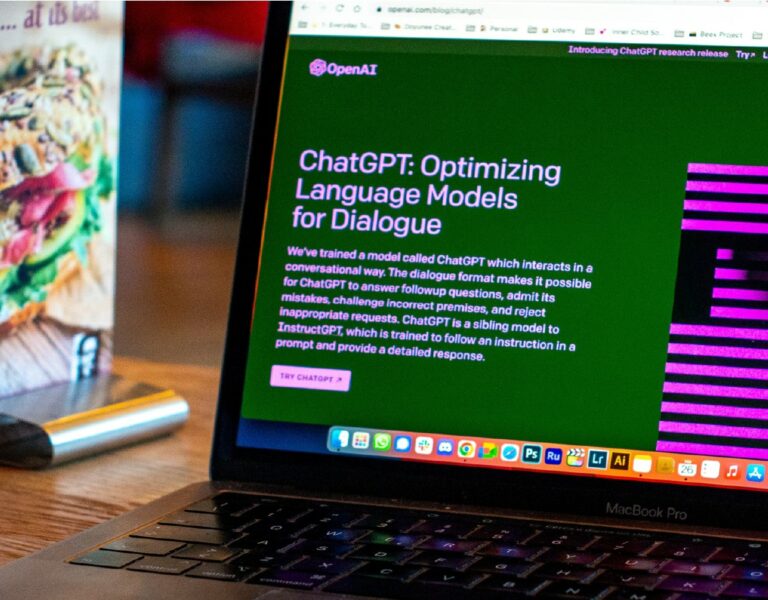ChatGPT. Stable Diffusion. DALL-E. Chances are, you’ve experienced the recent hype around generative AI. Every company, regardless of industry, needs to devise an AI strategy. Dev Patnaik provides a framework with which to start.
Given the deafening buzz in the six months since the public debut of ChatGPT, it can feel like we’ve entered an AI bubble. It’s pretty much all my clients and contacts want to talk about.
A normal business instinct when a frenzied hype develops — like how it is all about AI right now — is to sit back and wait till the dust settles. And that’s a view I’ve heard expressed by at least one company in describing their AI strategy. It’s usually a good instinct, but for the remarkably fast emergence of AI, it’s dead wrong.
AI is so transformative that the dust isn’t going to settle. This is a rare case where leaders need to believe the hype and get in the game or risk facing some very unpleasant consequences.
The Three Time Horizons for AI Response
Companies can achieve more clarity and direction around AI by planning their response based on three-time horizons — the next 12 months, the next three years, and the next decade — all of which leaders need to start on now.
Horizon 1: Rapid Response
In the short term, the main focus needs to be on actively defending your business from the profound disruptive impact of AI. It’s about litigation, legislation and public relations. Companies need to take legal steps to ensure that AI models aren’t stealing their intellectual property. They have to educate political representatives about the technology and the need for protective regulations. And they have to get their message out to start owning the narrative about AI.
Many companies, particularly in the music and publishing fields, are starting litigation against AI firms to stop them from pilfering their stuff. Getty Images has launched a lawsuit accusing AI image company Stable Diffusion of using more than 12 million of its photos to train its model. Universal Music Group had to threaten legal action to get Spotify and other streaming services to take down a viral AI-generated song that cloned the voices of artists Drake and The Weeknd. As the song climbed up the Spotify and YouTube rankings, the “Fake Drake” song provided an eerie example of selection AI blithely promoting generative AI.
Oops! We could not locate your form.
Any business that’s sharing information needs to be ready to defend itself by including language in contracts that specifies how its data can be used or seen by AI. Waiting for Congress to act is a losing game. These are the same lawmakers who still haven’t figured out how to regulate crypto and who aren’t exactly renowned for their deep understanding of technology.
Smart companies are already taking a proactive approach. A business with which I recently signed a contract inserted language specifying that a licensing deal would need to be agreed before any of its shared data could be used to train AI models.
Horizon 2: Core Business Innovation
The three-year horizon is about embracing the opportunities that AI represents to create more value, impact and profitability. Most companies — even large ones — have three to five core business activities that are central to their success. They should be working to apply AI to those core processes, seeking to add value to both the front-end and back-end of their business.
On the customer-facing side, AI brings huge opportunities to deliver more value and disrupt existing models. All but the most sophisticated, high-end financial advisers should be extremely nervous about AI, for example.
One of the speakers at the TED event I attended was Sal Khan, the founder of Khan Academy—the free online education platform. After initially losing sleep over ChatGPT last year, he realized it could hold the answer to education’s so-called 2 sigma problem, which refers to how students with a private tutor perform two standard deviations better than students taught in traditional classes. The problem is that there could never be enough private tutors to close the gap.
Enter AI. Khan Academy has since introduced its “Khanmigo” tutoring coach, which gives each student prompts, suggestions and feedback as they write. Before long, every kid in the world could have access to a personal AI tutor.
On the back end, AI holds the promise of huge gains in efficiency and cost reductions. It’s hard to imagine that mortgage approvals will still take days or weeks in the AI era.
Horizon 3: A Wisdom Upgrade
The ten-year horizon is going to be the most challenging work that companies need to do. On the third and longest time horizon, companies need to be able to respond with wisdom to the big and often scary issues that AI raises for our society. If you thought that social media has had a profound, uncontrolled effect on our world, just wait for AI. It will raise huge questions over what kind of world we want to live in and to what extent we’ll give up our decision-making and basic humanity.
That’s why over 40 groups, including songwriters, photographers, and baseball players, got together to form the Human Artistry Campaign to ensure that AI doesn’t erode culture and art.
The broader implications of AI are still unclear. We do know that rote work can be more easily automated. So can shallow work. It’ll be easy to have an AI write an email for you. It’ll be much harder to help you write a moving autobiography. Companies should help their teams master essential human activities such as trust building, deep work and wisdom.
My worry is that the current AI charge is being led by extremely smart people with relatively low levels of wisdom, whose decisions may come to be viewed by future generations as short-sighted and even immoral. In this environment, it is more important than ever for companies to start developing leaders who can navigate ambiguity and who are as wise as they are smart.
This article appeared in Forbes on June 20, 2023.

 Dev Patnaik
Dev Patnaik



